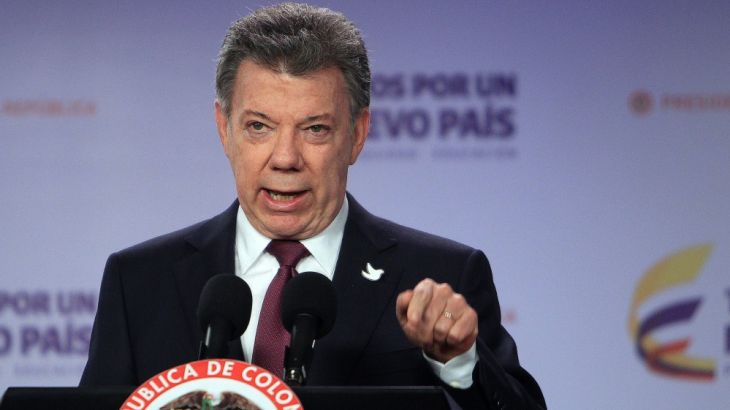Colombia: President Santos bids to save peace deal
Government opens new national dialogue after voters reject proposed peace deal with FARC in a shock referendum result.

Colombia’s government has started a national dialogue to seek peace with the FARC Marxist group, as both sides scrambled to revive a historic truce accord in the wake of a shock referendum defeat for the deal.
President Juan Manuel Santos held an emergency meeting on Monday with nearly all of Colombia’s political parties to try and chart a way forward, a day after voters narrowly rejected the hard-negotiated deal as too lenient on the rebels.
Keep reading
list of 4 itemsColombia agrees with ELN rebel group to extend truce
Amid uptick in kidnappings, Colombian family receives ‘biggest gift of all’
Her son was killed by the Colombian military. Now, she’s getting an apology
After the talks, Santos said he had asked the government’s chief negotiator, Humberto de la Calle, to “begin discussions as soon as possible addressing all the necessary issues to have an agreement and realise the dream of every Colombian to end the war with the FARC”.
INSIDE STORY: Can peace in Colombia be saved?
De la Calle had earlier offered his resignation, saying he did not want to be “an obstacle to what comes next”.
|
|
Both Santos and Rodrigo Londono, the top FARC commander better known by his nom de guerre Timochenko, put a brave face on the referendum setback after four years of negotiations in Cuba.
They vowed to maintain a ceasefire and keep working together, even though that could be another lengthy and complicated process.
“I will keep seeking peace until the last minute of my term,” said Santos, who leaves office in mid-2018.
In a statement, the FARC, or the Revolutionary Armed Forces of Colombia, said it would “remain faithful” to the accord and called on Colombians to mobilise peacefully to support the terms of the existing agreement.
The group also said it was prepared to “fix” the rejected deal, adding that the result “does not mean the battle for peace is lost”.
Senate President Mauricio Lizcano said that those who took part in the meeting at the presidential palace in the capital, Bogota, supported Santos in an attempt to salvage the peace process through renewed dialogue with a “specific timeline and concrete results”.
‘Not tough enough’
But Santos’s top political rival, former president Alvaro Uribe, who led the opposition to the deal during the referendum campaign, was notably absent from Monday’s talks.
Instead, his far-right Democratic Centre party issued a statement saying that it was ready for dialogue and asking the country to take note of its reasons for the No vote.
READ MORE: Colombians divided after voters reject FARC peace deal
Uribe and other opponents say they support the peace process but believe the accord was not tough enough on FARC.
The deal would have allowed the group’s leaders to serve in Congress, with a guarantee of 10 seats, and serve reduced sentences for crimes committed during a 52-year-old conflict that killed at least 220,000 – concessions opponents say went too far.
|
|
International reaction
Any renegotiated peace accord now seems to depend on whether FARC could accept tougher sanctions against them.
“No” voters want assurances that the rebels will hand over drugs, spend time in jail, and earn their political future at the ballot box rather than get guaranteed, unelected seats in Congress.
UN Secretary General Ban Ki-moon, who had offered a UN team to oversee the disarmament process, said he had “urgently” sent his Colombia envoy to Cuba’s capital, Havana, where the four-year talks have been held, for new consultations.
In a joint statement on Monday, several Latin American governments also expressed their continued support for the peace process in Colombia.
The surprise referendum defeat of the deal should not be interpreted as a rejection of peace, the foreign ministers of Brazil, Mexico, Argentina, Chile, Uruguay and Paraguay said.
Rural-urban split
The peace deal had been hailed as historic from the time it was concluded on August 24 to the moment it was signed last week in Cartagena in the presence of Ban and US Secretary of State John Kerry.
Opinion polls had showed the “Yes” camp well ahead, and negotiators had said there was no Plan B in the event of a “No” vote.
But voters rejected the agreement by a razor-thin margin: 50.21 percent for the “No” camp to 49.78 percent for “Yes”.
Voter turnout was low at just over 37 percent.
Although a referendum was not required to adopt the deal, Santos insisted on holding one to ensure its legitimacy.
The deal broadly split the country between those who have experienced the war first-hand and those who have mainly watched it on the news, experts said.
“The rural world, which has lived through the conflict, bet on peace. The urban world said ‘No’,” Ariel Avila, of Colombia’s Peace and Reconciliation Foundation, told AFP news agency.
“Because urban Colombia didn’t live through combat, air strikes … it doesn’t see the need” for making concessions to the leftist rebels, Avila said.
|
|